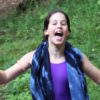Tomorrow night, my family will celebrate a Passover Seder, the annual ritual observed by Jews for millenia to commemorate the Israelites’ exodus from Egypt — a biblical story rife with flawed heroes, empathic heroines, paranormal occurrences and dramatic extremes. (It would make for an excellent YA series on Netflix.) The Passover narrative climaxes with the Israelites’ harrowing escape, through an unbelievably parted Red Sea, to begin their long, painful journey toward freedom.
In addition to reliving the emotional highs and lows of the exodus from Egypt, the Passover Seder includes a variety of rituals that are repeated year after year around a table filled with matzah, family and friends. The highlight of any Passover Seder is hearing the youngest child at the table chant the “Four Questions” (or “Ma Nishtanah” as they are known in Hebrew.) These four different questions in the Haggadah (the guide to the Seder) all begin with the phrase “How is this night different from all other nights?” and are then reflexively answered by articulating the aspects of the Seder different than a regular meal during the year. The questions and their answers are not particularly profound in their literal content, but rather, their deeper meaning may be found in the act of knowingly differentiating between what happens “on all other nights” and what happens on “this night.”
This year, quarantined in my parents’ basement, my children, my husband and I are preparing to celebrate Passover in a most unusual way: first with a short Zoom Seder with his family in England, later a quick Zoom Seder with my siblings and parents — who will sitting in a different area of their house — and then the last part of the Seder on our own. The irony of celebrating the journey from slavery to freedom while we are sheltering-at-home in a basement is not lost on me. In anticipation of what will certainly be the strangest Seder for our family to date, including the time my youngest child threw up all over the Seder table, himself and my husband, I am struck by the power of this simplest of questions — “How is this night different from all other nights?” — that will be asked this year as it always is. Asking this particular question, in this particular year, raises for all of us the painful truths of living through a global pandemic.
I will pose the question to my family, sitting around our small Seder table, likely highly annoyed with each other and impatient to speed through the rituals to get to the meal: “How is this night different from all other nights?” The answers from all of us right now will bring painful responses, realities we have worked hard to sidestep over the past month: our feelings of isolation and loneliness, disconnection and loss, hopelessness and worry. Perhaps, I have wondered, if we don’t ask this question of each other and of ourselves, we can avoid putting into words just how frightening this time feels. If we compartmentalize our fear and anxiety, our helplessness and our pain, maybe we can move forward unscathed. But that approach is not authentic to the painful story of an exodus from slavery to freedom, nor will it be true of the heartbreaking story that we are all in the midst of writing for ourselves and our world.
I have no choice but to ask the question: “How is this night different from all other nights?” and be prepared for my children’s true and hard and normal and healthy answers of disappointment and longing about their own lives, grief and loss for our world. As we sit with those truthful responses, I will take a deep breath and remind my kids that the Passover holiday actually has four names, one of which is the “Holiday of Springtime,” partially because it occurs annually in the spring season and partially because the symbolism of spring is inextricably linked to expressions of freedom. While it is a holiday of enslavement and pain, it is also a holiday of renewal and rebirth. I will encourage us, as we sit around the table together, to articulate the potential for how this strange moment in our lives might also allow for a springtime of sorts. I will push us to name together, not just the raw honesty of what we are all feeling, but also the paths through which we might bring hope to this moment. To express the ways in which we are beginning anew in this painful time, as individuals and as a family — deepening our connections to one another, showing green shoots of possibility as new signs of our love and devotion emerge.
While raising the question this year: “How is this night different from all other nights?” we will have to make room for the hard truths that the slavery of this pandemic has wrought, but I hope we will also open the door to springtime, to welcome in the possibility of hope and rebirth for our family and for our world during this dark time.
You can subscribe to the Dynamo Girl Newsletter here.







